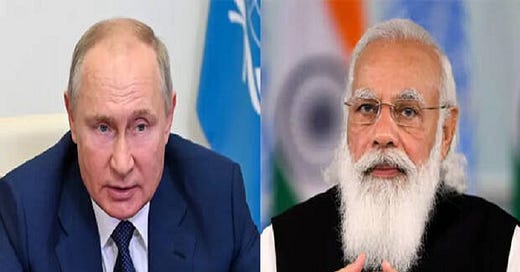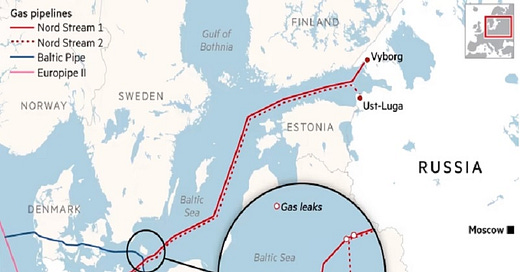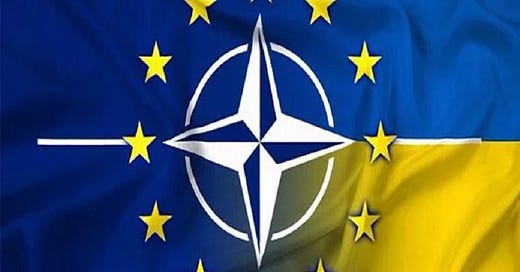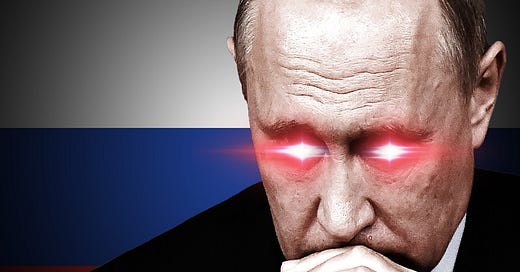
Modi’s Trip To Moscow Is Meant To Assess The Reliability Of Russia’s Geopolitical Balancing Act
The eight signals that Russia sent since the start of the year hinting at a pro-Chinese pivot alarmed Indian policymakers so much that they decided upon dispatching Prime Minister Modi there for the first time in five years to investigate what’s going on and whether their country can still rely on Russia in the future.
Indian Prime Minister Modi will visit Moscow from 8-9 July in what’ll be his first visit to Russia in half a decade since his participation at the Eastern Economic Forum in Vladivostok in 2019 as his host’s guest of honor. The purpose of his latest trip is to assess the reliability of Russia’s geopolitical balancing act after it sent a sequence of signals hinting at a pro-Chinese pivot which could come at India’s expense. Here are the eight moves that unsettled Indian policymakers the most since the start of the year:
----------
February: The Valdai Club Demotes India To The Same Level Of Regional Influence As Pakistan
The Valdai Club is Russia’s top elite networking platform, one of its leading think tanks, and hosts President Putin during its annual meeting every fall. Indians were accordingly shocked when its report from late February about “Charting the 2040: Younger Generation Insight on the World in the Making”, which was practically co-authored by Chinese-affiliated experts, demoted their country to the same level of regional influence as Pakistan and placed it at the bottom of a new international hierarchy on page 25.
March: Russia Hints At Inviting Pakistan To Join BRICS+ Through The Backdoor
Russian Presidential Aide Yuri Ushakov told TASS in early March that his country plans to invite the leaders of the Eurasian Economic Union, Commonwealth of Independent States, and the SCO to the BRICS+ Summit. The first two overlap, while the last’s members are either part of the preceding groups or already BRICS members with the exception of Pakistan. India therefore worried that its special and privileged strategic partner is planning to invite its Pakistani rival to BRICS+ through the backdoor.
April: Lavrov Opens Talks With China On A New Eurasian Security Concept
The Eurasian security concept that President Putin unveiled during his address to the Federal Assembly in late February was discussed by Foreign Minister Lavrov with his Chinese counterpart during his trip to Beijing in early April. From India’s perspective, it should have been brought on board with this initiative at the same time, thus conforming to fears that Russia is leaning towards China and is possibly on the path of becoming disproportionately dependent on it like some earlier predicted.
April-May: A Pro-Chinese Russian Hawk Is Reportedly Commissioned To Do Two Studies On Pakistan
Sergey Karaganov, who can be described as a pro-Chinese Russian hawk due to his lofty praise of the People’s Republic that he made in his scandalous proposal last summer for Russia to preemptively nuke Europe, was reportedly commissioned earlier this year to do two studies on Pakistan. Foreign agent-designated media first reported on it in April but the West didn’t pick up on it until May. These reports are about military-industrial cooperation and nuclear security, both of which naturally alarmed India.
May: Medvedev Says That Those Who Attend The Swiss Talks Are Taking Kiev’s Side Over Russia’s
Former Russian President and incumbent Deputy Chair of the Security Council Medvedev tweeted in late May that those who attend early June’s Swiss talks “are abandoning the equidistant stand and taking sides right with the bandera political regime.” He also ominously wrote that “such actions will be duly evaluated by Russia, and will definitely influence our relationship in the future. We will remember that.” Seeing as how India attended, it couldn’t help but be concerned about the future of their ties after that.
May-June: China Begins Leading A Brazilian-Fronted Parallel Peace Process On Ukraine
The joint Sino-Brazilian six-point consensus on peace in Ukraine was agreed to in late May and subsequently assessed in June to be the basis for creating a parallel peace process which aims to relaunch talks with Russia by November’s G20 Summit in Rio. This impending Chinese-organized but Brazilian-fronted framework could make Russia diplomatically indebted to the People’s Republic, which India believes could be one day exploited by China to pressure Russia into curtailing military exports to it.
June: Putin Says That His Eurasian Security Concept Complements China’s Global Security Initiative
President Putin told the Foreign Ministry in mid-June that his Eurasian security concept “complements and aligns with the basic principles of the Chinese global security initiative.” Seeing as how China and India are in a tense border dispute, and Beijing obviously doesn’t want to budge, Delhi interpreted this as possibly signaling a shift in Russia’s stance away from favoring their country and towards either neutrality or a pro-Chinese position. That would have serious national security implications if true.
June-July: Indian Media Reports On Russia’s Inconsistent Approach Towards India’s Territorial Integrity
An Associate Fellow at the Indian Ministry of Defense-funded IDSA think tank drew attention to Russia’s inconsistent approach towards their country’s territorial integrity in late June, which was then picked up and amplified by Indian media ahead of Prime Minister Modi’s visit to Moscow. From India’s viewpoint, it’s unacceptable that publicly financed Sputnik and RT, not to mention the Russian Foreign Ministry, are now tacitly questioning their country’s claims in contradiction of Moscow’s official policy.
----------
The eight examples that were enumerated above very strongly suggest that Russia began pivoting towards China since the start of the year after hitherto carefully balancing between it and India. The signals that were sent alarmed Indian policymakers so much they decided upon dispatching Prime Minister Modi to Moscow after a five-year hiatus in order to get to the bottom of what’s going on. As luck would have it, however, three fast-moving developments put them more at ease before his trip:
* 19 June: “Russia’s Mutual Defense Pact With North Korea Is A Geopolitical Game-Changer”
* 21 June: “The Russian-Vietnamese Strategic Partnership Checks US Influence In Southeast Asia”
* 23 June: “Russia’s Military Logistics Pact With India Complements Its Newly Recalibrated Asian Strategy”
Taken together with the insight that Lavrov shared on Indian geopolitics in late June, where he reaffirmed Russia’s respect of India’s multi-alignment policy, there are credible reasons to believe that the Kremlin has reconsidered its pivot towards China and is now back to balancing between it and India. Nevertheless, it’s still important for Prime Minister Modi to investigate what went on earlier this year and ensure that India’s interests will remain privileged by Russia, hence the purpose of his trip this week.
















I do not agree with this assessment based on the fact that at the recent SCO meeting in the past week, both India and China agreed to sit down and thrash out their current differences, as both realise that in the current time, with Western Hegemonic attitudes and behaviour, it is absolutely necessary for them to draw closer in a united front.
India's Geo location and BRICS membership, would make it foolish too, to continue animosity with China or diverge from Russia, especially given that India is making a mountain of money acting as a third party, selling Russian crude oil and gas, as well as refined petroleum products into the EU, so who would want to kill that revenue stream?
If anything, I believe that Modi is merely strengthening ties with Russia, and given the current trade deficit India has with Russia, would like to have Russia purchase more from India to reduce the deficit, and in addition Modi sees the importance of resolving differences with China, and might wish to ask Putin/Russia to mediate any impasse which may result out of the current proposed talks between India and China to resolve their differences, given the current trust relationship between both Russia and India, and Russia and China.
Furthermore, the development of the MBridge payment system, which provide other avenues for payments and to escape US dollar hegemony, together with other BRICS initiative developments as well as the grain trade market being setup by Russia, which frees up the food markets to market force pricing and food security, and would be more favourable to India, than a separation from its BRICS partners either through doubt or animosity
This assessment makes a lot more rational sense.
I think many in the government understand what russia is doing. There is no need to make issue of china - russia relations.Russia didn't object to india- US relations or India- UK, Australia ,France, germany relations. So,same thing
Eurasia security concept is good initiative.